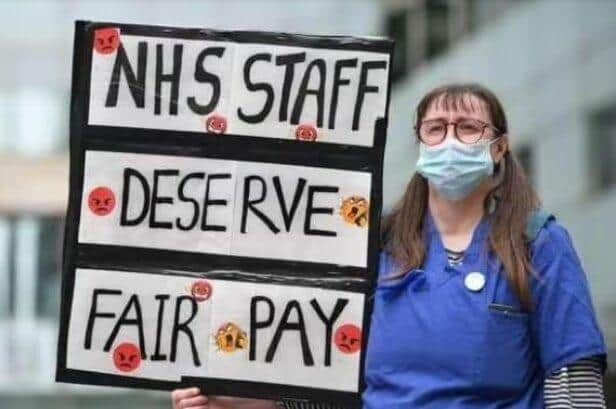Nurses' strike: this is how many Lancashire operations and appointments have been postponed by recent NHS staff walkouts
and live on Freeview channel 276
The organisation’s deputy chief executive, Maggie Oldham, told board members that the patch was “comparing well” with other areas when it came to how much patient activity had been postponed – and she praised the efforts of staff at all levels for helping to minimise the impact of what she described as an “extraordinary period” in the health service.
Her comments came days before a week that will see the biggest strike in NHS history. Members of the Royal College of Nursing (RCN) will take to picket lines on Monday and Tuesday (6th and 7th February) in their continuing push for a better pay deal for the current financial year and improved patient safety.
Advertisement
Hide AdAdvertisement
Hide AdNurses walked out for the first time ever in December, for two days, and did so again last month. This time around, 73 NHS trusts in England will be affected by the action – more than on any of the previous occasions.


Lancashire was not hit by the December strikes, but the county felt the impact of the walkouts last month, while this week’s action will affect the trust that runs the Royal Preston and Chorley and South Ribble hospitals – Lancashire Teaching Hospitals NHS Foundation Trust – and University Hospitals of Morecambe Bay NHS Foundation Trust, which operates the Royal Lancaster Infirmary.
Some ambulance staff will also walk out on Monday, having first started strike action just before Christmas. Physiotherapists are also set to stop work on Thursday.
Maggie Oldham told the ICB meeting that the NHS strikes to date had seen trusts serving Lancashire and South Cumbria have to postpone:
***nine inpatient procedures
***72 day case operations
***105 new outpatient appointments
***221 follow-up appointments.
Advertisement
Hide AdAdvertisement
Hide Ad“We’ve been able to re-book all of those patients …[and] our administrative staff are really playing their part in this complex jigsaw that they rebuild every day,” Ms. Oldham said.
Although no cancer operations had been postponed, some chemotherapy treatments had to be delayed on the day that they were due to take place, although these had all been rebooked within the same week, board members were told.
“During the strike period in Lancashire and South Cumbria so far, we are comparing well with the amount of activity that we have had to step down – and that is testament to the people that are working across all of our services.
“It’s easier to explain to my family that [say] you can’t get a train today…because there is a strike – but actually you can still go to hospital and and you can still go and get your appointments [when NHS workers are strike], because we’re 24/7 and we’re stretching ourselves in numerous ways in order to keep our services going.
Advertisement
Hide AdAdvertisement
Hide Ad“I really hope that this is a period in time that is soon behind us,” Ms. Oldham added.
NHS England says that during this week’s industrial action, anyone who is seriously ill or injured and their life is at risk, “should seek emergency care in the normal way, by calling 999 or attending A&E”.
Those who need urgent care should use NHS111 online or call NHS 111 to be assessed and directed to the right care for them.
Patients who have an appointment should attend as planned – even if their local trust is one of those affected by strikes – unless they have been contacted to rearrange it.
On Sunday, RCN general secretary Pat Cullen wrote to Prime Minister Rishi Sunak urging him to intervene to bring the nurses' strike to “a swift close”.
